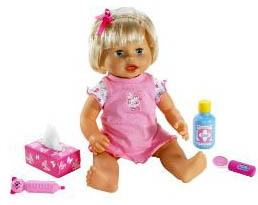Little Mommy Baby Achoo Doll
Baby Ah-Choo doll makes over thirty real sounds such as sneezing and saying she is sick
 Squeeze this baby doll's stomach and she sneezes: Ah Choo! I'm sick; tissue please. It is your job to get her better with an interactive thermometer and medicine. Baby reacts with different sounds, 30 in all. You need medicine, baby. She is all stuffed up and needs your help. This doll is a way to play little mommy.
Squeeze this baby doll's stomach and she sneezes: Ah Choo! I'm sick; tissue please. It is your job to get her better with an interactive thermometer and medicine. Baby reacts with different sounds, 30 in all. You need medicine, baby. She is all stuffed up and needs your help. This doll is a way to play little mommy.
A baby doll that is designed to be sick and in need of care can play a powerful role in fostering compassion and empathy in children. This type of play encourages children to step into the role of a caregiver, promoting understanding and sensitivity towards the needs of others.
Role of Caregiver: When children interact with a sick baby doll, they assume the role of a caregiver. This experience allows them to practice nurturing behaviors, providing comfort, and addressing the doll's needs. As they tenderly care for the doll, children learn firsthand the significance of offering support and kindness to those who require assistance.
Emotional Connection: Children often develop an emotional connection to their toys, and a sick baby doll amplifies this bond. By witnessing the doll's "sickness," children begin to grasp the concept of vulnerability and the importance of being there for someone who is unwell. This emotional connection opens the door to conversations about empathy and compassion.
Imitating Real-Life Situations: Play scenarios involving a sick baby doll mirror real-life situations where individuals, especially children, may experience illness or discomfort. Through imaginative play, children learn to respond with care and concern, paving the way for them to exhibit similar empathy when faced with real-life situations.
Understanding Needs: A sick baby doll prompts children to identify and address the doll's needs, such as administering "medicine," offering comfort, and providing rest. This process helps children develop the ability to recognize and respond to the needs of others, a skill that forms the foundation of compassion and empathy.
Learning Through Play: Play is a natural way for children to learn about the world around them. Engaging with a sick baby doll encourages children to explore emotions, caregiving, and compassion in a safe and creative environment. These experiences shape their understanding of human interactions and relationships.
Transferring Lessons to Real Life: The compassion children develop while caring for a sick baby doll can extend beyond playtime. As they internalize the importance of compassion, children are more likely to exhibit considerate and empathetic behavior in their interactions with peers, family members, and others they encounter in their daily lives.
A baby doll designed to be sick and in need of care like Baby Achoo serves as a valuable tool for nurturing compassion in children. By engaging in nurturing play, children cultivate empathy, learn to recognize the needs of others, and develop a strong foundation for displaying kindness and understanding in various contexts.
